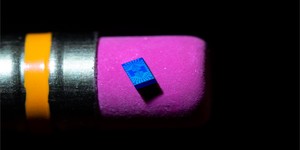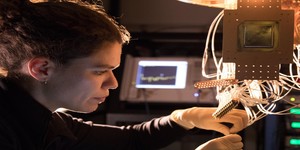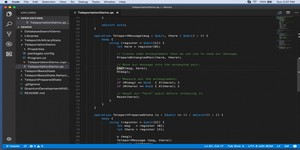
Intel has announced a partnership with the Delft University of Technology's QuTech institute which will see the pair spend the next decade researching quantum computing technology together.
Traditional computers are easy to understand, operating logically at a binary level: any particular bit is either on, a binary one, or off, a binary zero. Quantum computers replace these neat bits with qubits, quantum bits, which can be both on and off at the same time - a state known as quantum superposition. A machine made of qubits, then, can analyse a problem in parallel where a traditional computer would need to take a serial approach. The result: for certain workloads, a vast increase in performance.
Anything involving performance increases and computers is of natural interest to Intel, so it's unsurprising to find the company partnering up with TU Delft's QuTech institute and the Dutch Organisation for Applied Research to spend the next decade solving some of the problems that keep quantum computers from being fully commercially viable. 'A fully functioning quantum computer is at least a dozen years away, but the practical and theoretical research efforts we're announcing today mark an important milestone in the journey to bring it closer to reality,' said Mike Mayberry, Intel vice president and managing director of Intel Labs, of the partnership.
Under the terms of the deal, Intel is providing $50 million in funding and 'significant engineering resources' to TU Delft's dedicated quantum computing division. 'Expertise in specialised electronics combined with advanced physics is required to move quantum computing closer to being a reality,' continued Mayberry. 'While qubit development has been the focus of quantum computing research to date, low-temperature electronics will be required to connect, control and measure multiple qubits, and this is where we can contribute. Our collaboration with QuTech will explore quantum computing breakthroughs that could influence the industry overall.'
Although D-Wave Systems has already launched a trio of quantum computers, its critics claim that the systems available now are not true quantum computing devices and fail to offer real-world performance gains when compared to classical computing devices.
Traditional computers are easy to understand, operating logically at a binary level: any particular bit is either on, a binary one, or off, a binary zero. Quantum computers replace these neat bits with qubits, quantum bits, which can be both on and off at the same time - a state known as quantum superposition. A machine made of qubits, then, can analyse a problem in parallel where a traditional computer would need to take a serial approach. The result: for certain workloads, a vast increase in performance.
Anything involving performance increases and computers is of natural interest to Intel, so it's unsurprising to find the company partnering up with TU Delft's QuTech institute and the Dutch Organisation for Applied Research to spend the next decade solving some of the problems that keep quantum computers from being fully commercially viable. 'A fully functioning quantum computer is at least a dozen years away, but the practical and theoretical research efforts we're announcing today mark an important milestone in the journey to bring it closer to reality,' said Mike Mayberry, Intel vice president and managing director of Intel Labs, of the partnership.
Under the terms of the deal, Intel is providing $50 million in funding and 'significant engineering resources' to TU Delft's dedicated quantum computing division. 'Expertise in specialised electronics combined with advanced physics is required to move quantum computing closer to being a reality,' continued Mayberry. 'While qubit development has been the focus of quantum computing research to date, low-temperature electronics will be required to connect, control and measure multiple qubits, and this is where we can contribute. Our collaboration with QuTech will explore quantum computing breakthroughs that could influence the industry overall.'
Although D-Wave Systems has already launched a trio of quantum computers, its critics claim that the systems available now are not true quantum computing devices and fail to offer real-world performance gains when compared to classical computing devices.

MSI MPG Velox 100R Chassis Review
October 14 2021 | 15:04








Want to comment? Please log in.